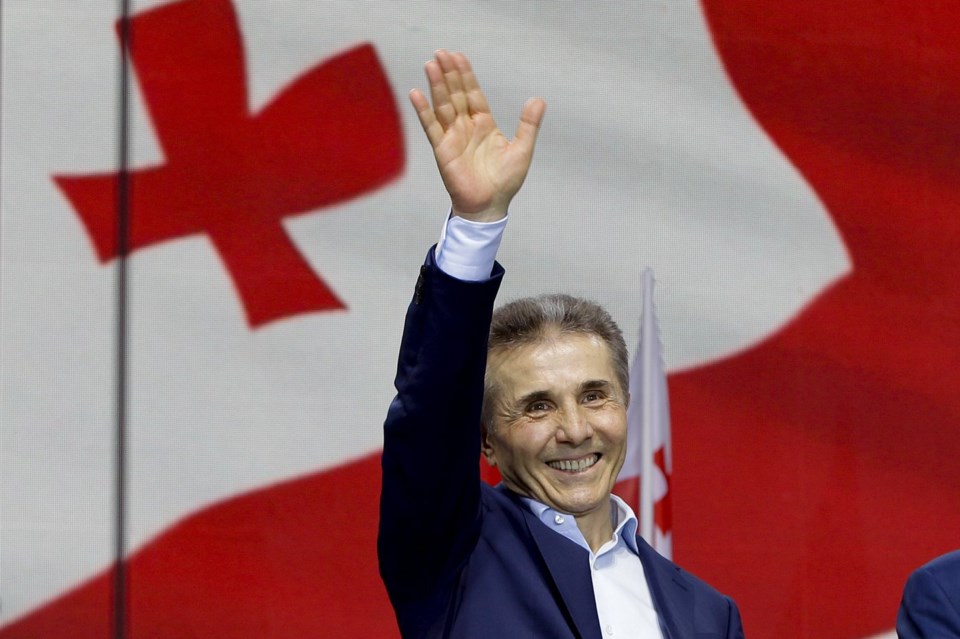TBILISI, Georgia (AP) — Georgia’s president Salome Zourabichvili Sunday said the country was the victim of a Russian “special operation” as she she stood alongside Georgia’s opposition to say she did not recognize the results of the vote.
She called on Georgians to come out at 7 p.m. on Monday on the main street in the capital to protest the result, which she said was a “total falsification, total stealing of your votes.” She spoke the day after an election which could decide Georgia's place in Europe.
The Central Election Commission said Sunday that the ruling party, Georgian Dream, got 54.8% of Saturday’s vote with almost 100% of ballots counted.
European electoral observers said the election took place in a “divisive” environment marked by intimidation and instances of physical violence which undermined the outcome of the vote.
The pre-election campaign in the South Caucasus nation of 3.7 million people, which borders Russia, was dominated by foreign policy and marked by a bitter fight for votes and allegations of a smear campaign.
Initial figures suggested turnout is the highest since the ruling party was first elected in 2012.
Monitoring officials from the Organization for Security and Co-Operation in Europe said Sunday they had multiple concerns about the conduct of the election including vote buying, double voting, physical violence and intimidation.
Georgian Dream used hostile rhetoric and “promoted Russian disinformation” and conspiracy theories ahead of the election in an attempt to “undermine and manipulate the vote,” Antonio Lopez-Istruiz White from the OSCE said.
Georgian electoral observers, who stationed thousands of monitors across the country, reported multiple violations and said the results “do not correspond to the will of the Georgian people.”
Georgian Dream has become increasingly authoritarian, adopting laws similar to those used by Russia to crack down on freedom of speech. Brussels suspended Georgia’s EU membership process indefinitely because of a “Russian law,” passed in June.
Bidzina Ivanishvili, the billionaire founder of Georgian Dream who made his fortune in Russia, claimed victory almost immediately after polls closed and said, “It is rare in the world for the same party to achieve such success in such a difficult situation.” He had vowed ahead of the election to ban opposition parties should his party win.
Tina Bokuchava, the chair of the United National Movement opposition party accused the election commission of carrying out Ivanishvili’s “dirty order” and said he “stole the victory from the Georgian people and thereby stole the European future.”
She indicated the opposition would not recognize the results and “will fight like never before to reclaim our European future.”
The UNM party said its headquarters were attacked on Saturday while Georgian media reported two people were hospitalized after being attacked outside polling stations.
Some Georgians complained of intimidation and being pressured to vote for the governing party.
Georgian Dream scored its highest share of the vote — polling almost 90% — in the Javakheti region of southern Georgia, 135 kilometers (83 miles) west of the capital Tbilisi where it failed to get more than 44% of the vote in any district.
Before the election, The Associated Press traveled to the region where many people are ethnic Armenians who speak Armenian, Russian and limited Georgian. Some voters suggested they were while several questioned why Georgia needed a relationship with Europe and suggested it would be better off allied with Moscow.
Around 80% of Georgians favor joining the EU, according to polls, and the country’s constitution obliges its leaders to pursue membership in that bloc and NATO. Many fear that Georgian Dream is dragging the country toward authoritarianism and killing off hopes of becoming an EU member.
—
Associated Press producer Sophiko Megrelidze contributed to this report
Emma Burrows, The Associated Press


